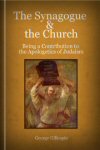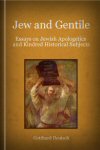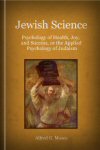Classic Studies in Jewish Apologetics (3 vols.)
Digital Logos Edition
Overview
The three volumes in this collection explore numerous arguments in support of the Jewish religion. Many of them specifically address areas of disagreement between Christians and Jews. Others explore the place of the Jewish people in history and society. Written by experts in their fields, the books in this collection will equip you to understand the difference between Jewish and Christian beliefs, appreciate the unique challenges the early twentieth century presented the Jewish people, and furnish you with the ability to engage in religious dialogue.
The Logos editions of Classic Studies in Jewish Apologetics enhance your study with amazing functionality. Fully integrated into your digital library, the Timeline enables you to instantly contextualize the people, places, and ideas discussed in the journal with thousands of other biblical and world events. Perform powerful searches to instantly gather relevant biblical texts and resources together. Free tablet and mobile apps let you take the discussion with you. With Logos Bible Software, the most efficient and comprehensive research tools are in one place, so you get the most out of your study.
For more on Jewish thought in the twentieth century, check out 20th Century Jewish Religious Thought.

Key Features
- Presents Jewish responses to Christian claims
- Explores the place of Jewish people in history, society, and religion
- Interacts with a diversity of viewpoints
Product Details
- Title: Classic Studies in Jewish Apologetics
- Volumes: 3
- Pages: 876
- Christian Group: Jewish
- Resource Type: Topical
- Topic: Philosophy and Apologetics
Individual Titles
- The Synagogue and the Church: Being a Contribution to the Apologetics of Judaism by Paul Goodman
- Jew and Gentile: Essays on Jewish Apologetics and Kindred Historical Subjects by Gothard Deutsch
- Jewish Science: the Applied Psychology of Judaism by Alfred G. Moses

This book is a must read for anyone seeking to understand religious dialogue between Jews and Christians. The Jewish religion has made a serious impact on religious thought for thousands of years. However, the Christian church claims that the Jewish religion has been fulfilled in Jesus Christ. In The Synagogue and the Church Paul Goodman calls into question the legitimacy of the Christian claim. Arguing that Christians are guilty of logical inconsistencies and moral failings, Goodman presents a thorough defense of the primacy of Judaism. Both Jews and Christian’s seeking to better understand their partners in religious debate will find this work to be helpful.
Paul Goodman (1875–1949) was an influential British zionist and honorary secretary of the Zionist Movement of London. He is the author of The Synagogue and the Church, History of the Jews, Zionism in England, and The Jewish National Home.

First published in a time of tremendous political upheaval for the Jewish people, this book collects essays on the relationship of the Jewish people to the state, society, and people of other religions. Deutsch addresses a wide array of issues pertinent to his time, including the need for a robust Jewish journalism and the lack of Jewish biographies. At many points, Deutsch’s words are a direct challenge to Christians. He argues that the traditional understanding of the origin of Christianity is unhistorical, and that the Protestant Reformation wreaked havoc upon the Jews. His work is helpful for anyone seeking to understand the unique situation of the Jewish people in twentieth century.
Gotthard Deutsch (1859–1921) was a scholar of Jewish history also known for his work in biblical studies. His books include Memorable Dates in Jewish History and The History of the Jews.

Alfred Moses explores the subject of divine healing and explains practical methods for attaining true health, joy, and success. Rooting his teaching in the Hebrew Bible, Moses suggests numerous spiritual disciplines for the attainment of spiritual and physical health. Arguing that by application of “the laws of the mind” disease may be gradually cured, Moses connects one’s spiritual condition and faith with outward manifestations of disease. With answers to skeptics’ questions peppered throughout, Jewish Science represents a unique crossroads of science, medicine, and apologetic dialogue.
Alfred G. Moses was the founder of the Jewish Science movement, a branch of Jewish philosophy similar to Christian Science. His book Jewish Science: Psychology of Health, Joy and Success or the Applied Psychology of Judaism stands as the movement’s definitive text.